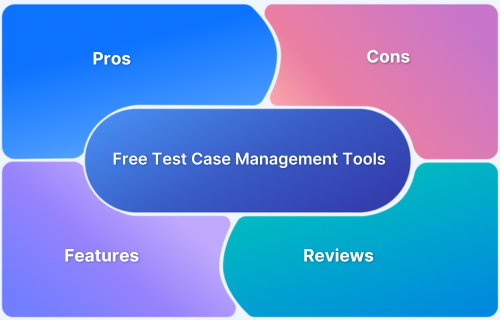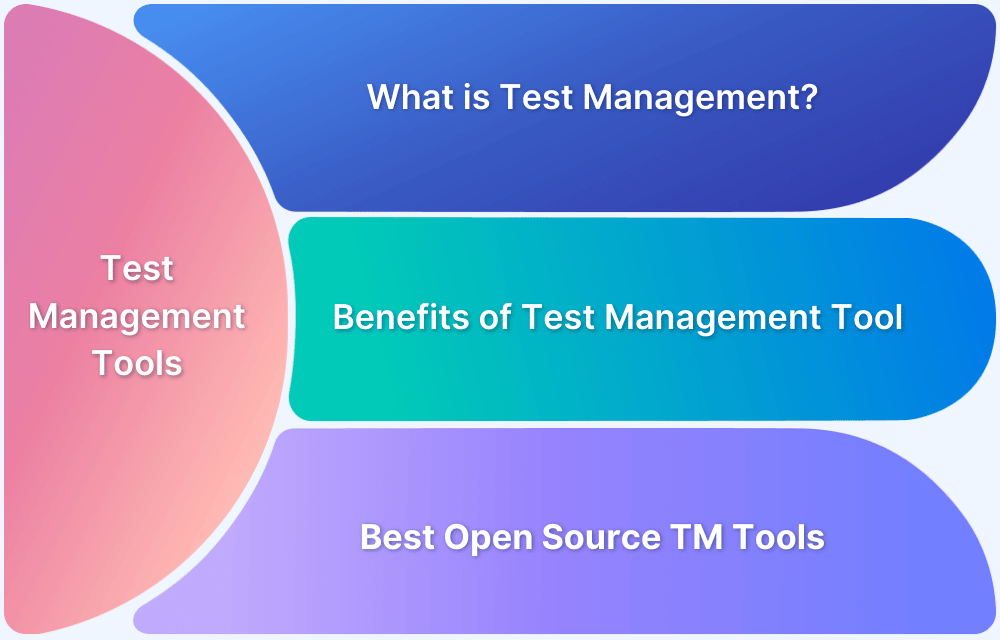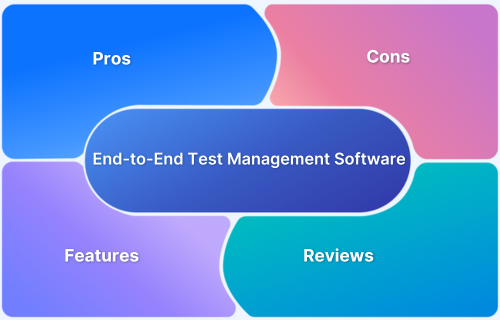TestLink has long been a go-to open-source tool for test management, helping teams organize test cases and track defects. But as testing practices have evolved, QA teams now seek modern alternatives that offer richer features, stronger integrations, and a more intuitive experience.
Overview
Popular Open Source Alternatives to TestLink
- BrowserStack Test Management: AI-powered cloud platform accelerating test creation, execution, and automation with seamless integrations and real-time insights.
- Kiwi TCMS: Open source test management with strong case editing, execution tracking, and rich API integrations.
- testomat.io: Modern open source-inspired tool with automation syncing, BDD support, and robust test analytics.
- Squash TM: Open source platform focusing on manual tests, campaign management, and CI/CD integration.
- Testiny: Lightweight open source tool for fast manual test planning and basic automation support.
- Tuleap: Open source ALM with integrated Agile test management, issue tracking, and CI/CD pipelines.
- Zebrunner: Continuous testing dashboards combining manual and automated test monitoring with rich metrics.
- TestLodge: Simple, cloud-based manual test management with two-way defect tracker integration.
- TestPad: Minimalist checklist-driven test management app focused on easy manual testing.
- Qase: Cloud-native open source-inspired platform blending manual and automation test management with strong API support.
This article explores the top open-source alternatives to TestLink in 2025, highlighting their features, benefits, and why they might be a better fit for your testing needs.
What are Open Source Test Management Tools?
Open-source test management tools are software platforms designed to help QA teams plan, create, execute, and track test cases without the high costs associated with proprietary tools. These tools are developed and maintained by a community of contributors, providing flexibility, transparency, and customization options.
Teams can modify the tool’s code to fit their specific needs and integrate it into their existing testing frameworks.
Unlike commercial tools, open-source test management software often comes with no licensing fees, making it an attractive choice for smaller teams or startups.
Why Consider TestLink Alternatives for Test Management?
While TestLink has served as a reliable tool for many years, it comes with certain limitations that drive teams to explore alternatives:
- Outdated User Interface: TestLink’s interface can feel clunky and lacks the modern, intuitive design that newer tools offer.
- Limited Integration: TestLink’s integrations with other tools and platforms can be complex and often require custom configurations.
- Scalability Issues: As teams and projects grow, TestLink’s infrastructure can struggle to keep up, making it harder to manage large volumes of test cases and users.
- Lack of Automation Support: TestLink offers basic automation capabilities, but newer alternatives are designed to integrate more seamlessly with modern CI/CD and test automation tools.
- Community Support: While TestLink has a community-driven support system, many alternative tools offer better documentation, active support, and regular updates.
Learn More:TestRail Alternatives for Test Management
How to Choose Open Source Alternatives to TestLink?
When selecting an open-source alternative to TestLink, consider the following key factors:
- Feature Set: Ensure the alternative offers the core test management capabilities you need, such as test case management, defect tracking, and reporting. Look for additional features like integrations with CI/CD tools, automation support, and real-time reporting.
- Scalability: Choose a tool that can grow with your team or project. Consider how well the tool can handle increased test cases, users, and complex workflows.
- Community and Support: A strong user community and active development are essential. Look for tools with comprehensive documentation, user forums, and frequent updates to ensure long-term reliability.
- Integration Capabilities: Ensure the tool integrates well with your existing development and testing tools, like Jira, GitHub, Jenkins, or other CI/CD platforms.
- User Interface: A clean, intuitive UI will streamline adoption and improve the overall testing process. Ensure the tool is easy for both developers and QA engineers to use.
Also Read:13 Best Test Management Reporting Tools
Top Open Source Alternatives to TestLink for Test Management
Here is a list of some of the top open source alternatives to TestLink. These tools offer modern features, robust integrations, and scalable solutions for managing test cases and tracking defects.
1. BrowserStack Test Management
BrowserStack Test Management is an AI-driven, unified platform built to speed up test case creation, execution, and automation delivering up to 90% faster authoring and 50% greater coverage.
It integrates seamlessly with existing workflows, offering real-time insights through customizable dashboards and intelligent AI agents that simplify both manual and automated testing.
Best as a modern cloud alternative with advanced AI features, offering seamless scaling and integration beyond traditional open source tools like TestLink.
- AI-Powered Test Authoring: Automatically create detailed test cases from PRDs, user stories, or text inputs. AI refines and enhances existing cases, reducing manual effort.
- Smart Test Suite Optimization: The AI-driven Deduplication Agent identifies similar or duplicate tests and suggests clean-up actions to maintain an efficient repository.
- Low-Code Automation: Transform manual test cases into low-code automated scripts to speed up automation without heavy technical overhead.
- Intelligent Test Selection: AI helps prioritize and select the most impactful tests for each run, ensuring optimal coverage and faster execution.
- Centralized Test Management: Manage manual and automated testing in one unified hub with complete traceability from requirements to defects via integrations with Jira, Azure DevOps, and more.
- Real-Time Insights: Customizable dashboards provide instant visibility into release progress, coverage metrics, and historical performance trends.
- Reusable Test Components: Create shared steps for repetitive actions, improving test creation speed and consistency across projects.
- Seamless Data Migration: Import test cases easily from CSV files or legacy tools with automatic field mapping and customization options.
- Two-Way Jira Integration: Sync test cases and runs bi-directionally between BrowserStack and Jira through an AI-powered app for effortless collaboration.
- Unified Execution Management: Plan and execute both manual and automated test runs in one place, supporting dynamic test sets and easy result uploads from popular frameworks like JUnit and BDD-JSON.
The free version of BrowserStack Test Management offers unlimited test cases, robust integrations, and real-time reporting capabilities.
Try BrowserStack Test Management
2. Kiwi TCMS
Kiwi TCMS is a comprehensive open source test management tool with strong support for test case creation, execution, and integration with automation tools via plugins.
Key Features:
- Markdown-based test case editor with cloning and history
- Manual and automated test execution tracking
- Integration with Jira, Bugzilla, and CI/CD pipelines
- Extensive API access for customization
Better for teams seeking an actively maintained, extensible open source alternative with richer API support than TestLink.
3. testomat.io
testomat.io provides open source-inspired flexible test management focusing on automation integration, BDD support, and robust reporting in the cloud.
Key Features:
- Automation syncing with Selenium, Playwright, Cypress
- BDD/Gherkin syntax support with reusable steps
- Analytics across thousands of test results
- REST API and extensive integration capabilities
Offers a modern interface with advanced automation insights, ideal for teams looking beyond TestLink’s manual-centric approach.
4. Squash TM
Squash TM is an open source test management platform emphasizing manual testing with CI/CD integration and campaign management features.
Key Features:
- Manage test cases and campaigns across environments
- Integrates with Jenkins, GitLab, and automated frameworks
- Visual reports with export support
- Comprehensive requirements and version management
Strong in CI/CD and automation integration; preferable for teams looking to modernize TestLink workflows with better DevOps alignment.
5. Testiny
Testiny is a lightweight open source test management tool designed for fast manual test planning with basic automation support and defect tracking.
Key Features:
- Easy test case creation and execution logging
- Basic automation integration and reporting
- Defect linking and team collaboration tools
- Configurable test templates and real-time analytics
Great for smaller teams needing simple workflows and quick setup, serving as a functional but lightweight alternative to TestLink.
6. Tuleap
Tuleap is an open source ALM platform that includes robust test management with support for Agile, Scrum, Kanban, and DevOps workflows.
Key Features:
- Test case creation and execution in Agile contexts
- Integrated wiki, document management, and issue tracking
- Traceability from requirements to bugs and tests
- CI/CD pipeline integration and Scrum/Kanban boards
Ideal for teams wanting full ALM capabilities with test management tightly coupled to development processes, surpassing TestLink scope.
Read More: Top Test Management Tools for Agile Teams
7. Zebrunner
Zebrunner offers open source-powered continuous testing dashboards integrating automated and manual test monitoring into one platform.
- Centralized test execution reporting and dashboards
- Integration with Selenium, Appium, and CI/CD tools
- Real-time quality metrics and team collaboration views
- Support for automated and manual testing in one system
Suitable for teams requiring detailed automation analytics combined with manual test tracking, advancing beyond classic TestLink features.
8. TestLodge
TestLodge provides a straightforward, open source-inspired cloud test case and test management tool focused on manual testing with integrations to popular issue trackers.
Key Features:
- Simple test plan and case organization
- Two-way defect tracker integration with Jira, GitHub
- Execution tracking with real-time status reports
- Test templates and bulk import/export
Good for teams prioritizing ease of use and defect integration as an alternative to more complex TestLink UI and setup.
9. TestPad
TestPad is a minimalist, open source-inspired test management app focusing on checklist-style manual testing and usability.
Key Features:
- Checklist-driven test plans and execution logging
- Commenting and collaboration tools
- Export and reporting support
- Lightweight with minimal learning curve
Effective for teams wanting a distraction-free manual testing focus, less complex than TestLink’s feature set.
Learn More: Understanding AI Test Management
10. Qase
Qase is a cloud-based open source-inspired test management platform blending manual and automated test management with API and CI/CD support.
Key Features:
- Intuitive test case and suite management
- REST API and integration with Jira, Slack, Postman
- Real-time test run reporting and audit logs
- Easy migration and CSV import/export
Best for teams seeking a modern tool combining test management and automation reporting while being more user-friendly than TestLink.
Benefits of Open Source Alternatives to TestLink
Open-source alternatives to TestLink offer several advantages that make them attractive to QA teams, particularly those with limited budgets or a preference for flexibility. Key benefits include:
- Cost-Effectiveness: Open-source tools are free to use, eliminating licensing fees associated with proprietary software, making them ideal for small teams or startups.
- Customization: Being open-source, these tools can be customized to suit specific project needs, allowing teams to tailor the software to their unique testing workflows.
- Flexibility: Open-source alternatives typically offer a high level of flexibility in terms of integrations with other tools and platforms, such as CI/CD pipelines, version control systems, and issue tracking.
- Community Support: Open-source tools come with active user communities that provide support, plugins, and continuous improvements, helping users troubleshoot and innovate.
- Scalability: Many open-source tools, such as Kiwi TCMS and Squash TM, offer scalability for growing teams, enabling you to expand your test case management capabilities as needed.
Why is BrowserStack Test Management the Best Alternative to TestLink?
While there are many open-source alternatives, BrowserStack Test Management stands out for its AI-powered automation, seamless integration with CI/CD tools, and cloud-based architecture.
It provides a unified platform that supports both manual and automated testing, offering superior scalability and real-time collaboration across distributed teams.
BrowserStack’s enterprise-grade security and reporting capabilities make it the ideal solution for teams that need both flexibility and reliability.
Conclusion
Choosing the right test management tool is crucial for ensuring efficient, high-quality software testing. While TestLink remains a solid open-source option, tools like BrowserStack Test Management offer more modern features, better integrations, and enhanced scalability.
By evaluating your team’s needs and project complexity, you can select the best test management tool that streamlines your testing efforts, fosters collaboration, and accelerates delivery.








